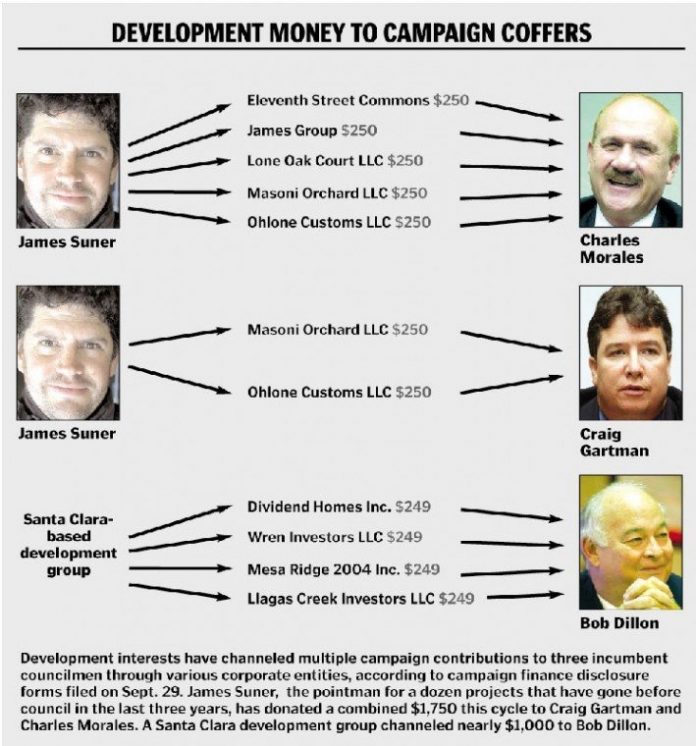Campaign Funds in Question Contributions raise inquiry: Is
there a campaign finance loophole or is it business as
usual?
Gilroy – Half the campaign funds accepted by incumbent councilmen Bob Dillon and Charles Morales have come from just two development groups, but the two men running for re-election in November believe the contributions meet the letter and spirit of campaign finance laws.
Campaign finance disclosure forms submitted to City Hall Sept. 29 show that local developer James Suner steered $1,250 to Morales’ campaign coffers through five separate limited liability companies, a move intended to meet the local cap of $250 on individual campaign contributions. Meanwhile, a Santa Clara development group channeled $996 to Dillon through four corporate entities. In both cases, candidates listed the contributions on campaign forms as coming from separate groups, with no indication of the affiliation between the entities.
Morales said Suner is a “brilliant developer” who is “above the bar and honest,” but that he would “certainly check it out and if something is wrong I will return the funds.”
Dillon also said he does not believe the contributions he received run afoul of campaign laws, but said he would investigate further to ensure the funds are handled properly. He said he has never had any contact with the individuals behind the various entities and that his treasurer receives the checks in the mail and notifies him daily of the contributors.
City Hall development records show that Dividend Homes Inc., one of the four entities that contributed $249 to Dillon, has not received a development approval from City Council since 2000 – before Dillon was elected to the governing body.
“All I can tell you is we’ve played it on the up and up,” he said. “But if we have to, we’ll send some checks back.”
Council hopeful Peter Arellano admitted asking Suner for a campaign contribution but has not received any funds.
“The obvious question would be if this money is influencing people’s decision on the dais,” he said. “I can’t answer that. I think that has to be answered by the city attorney and probably brought to the state’s Fair Political Practices Commission. Is it a gray area or not? They say it is, but I think it needs to be looked at more closely by someone outside the city.”
While state guidelines require candidates to add up multiple donations from the same person or entity and disclose them as a lump sum, the law grows fuzzy around the question of contributions from corporations and limited liability companies. Developers and other business owners commonly form the latter entities to shield personal or corporate assets from creditors invested in a particular enterprise.
A campaign disclosure booklet written by the FPPC and issued to all candidates states that contributions must be “aggregated” when they come “from two or more entities if a majority of the same persons directs and controls the contributions of each entity.”
A state database of LLCs lists Suner as the sole partner behind the five limited liability companies that contributed to the Morales campaign. Suner maintained, however, that he is not the “controlling” member of the entities, but simply serves as pointman on the various projects for a changing group of investors. He declined to identify those partners, but said he believes the contributions meet the letter of the law.
“This is the third or fourth election we’ve done this and I’ve called (City Hall) to check and they said as long as it’s not a single owner, it’s fine,” Suner said. “We’re not trying to circumvent any campaign laws or anything and if it turns out to be a violation we’ll ask for the money back.
“If you wanted to circumvent campaign finance laws there are a lot more interesting ways to do it,” Suner added. “You can set up political action committees and pay for all their advertising. You can collect unlimited $99 checks.”
While state law does not require candidates to publicly disclose contributions of less than $100, candidates must keep records of such small amounts in case the FPPC audits or investigates.
The James Group, one of Suner’s development partnerships, gave at least $1,350 to candidates in the 2003 election.
Suner is a prominent member of the local development community who has received overwhelming approval from councilmen on nine developments in the past three years, and is currently working to obtain approval on three more projects. He has played an influential role in shaping development guidelines for the Hecker Pass area, the city’s scenic western gateway, and in crafting policies credited for revitalizing the downtown area.
While Suner is a familiar and outspoken voice in the community, the out-of-town developers who gave to Dillon’s campaign are relatively unknown.
“I wouldn’t know them from a box of rocks,” Dillon said, referring to the five people in varying combinations who serve as partners or officers for the groups that donated $249 each to his campaign.
Mary Beth Long, who serves as legal agent for all four groups, did not return a call for comment. All four entities share the same street address.
Dillon suspects the variation in partners and officers behind the contributing groups is no accident.
“It doesn’t meet the standard (for a campaign violation) in any of the cases I saw on those checks,” he said. “I would imagine that’s by design.”
Morales also planned to review the checks he received from the Suner affiliates to ensure compliance with the law.
A spokesperson at the California Fair Political Practices Commission, which investigates and prosecutes individuals for campaign finance violations, would not comment on the situation, referring it instead to city attorneys. Jolie Houston, the city’s deputy acting attorney, said the matter is under review.
City ordinance states that violators of campaign finance limits can be penalized $1,000 or as much as three times the amount accepted in illegal contributions.
Mark Zappa, a local Republican campaign organizer and opponent of campaign finance restrictions, said “there are so many nuances that you have to be an accountant or a lawyer to figure it out. It’s unfortunate because the law doesn’t care if you understand the rules or not. If you violated it, you better have a dang good reason.”
Funds raised
As of Sept. 29
Candidate Total*
Peter Arellano $3,661
Dion Bracco $2,661**
Bob Dillon $1,662
Craig Gartman $2,864
Charles Morales $3,102
*Does not include funds carried over from past election cycles
**Does not include an $8,500 loan Bracco made to himself













